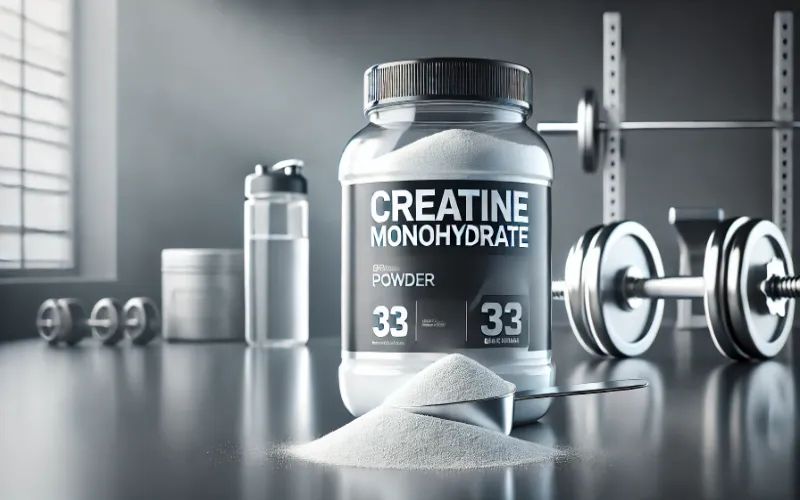Creatine monohydrate is one of the most studied and trusted sports supplements available today. Naturally found in small amounts in red meat, poultry, and fish, creatine plays a crucial role in energy production during high-intensity exercise.
For athletes, creatine supplementation can make a measurable difference in strength, power, muscle mass, and recovery time. Its safety and effectiveness are well supported by decades of research, making it a staple in sports nutrition worldwide.
Table of Contents
How Creatine Monohydrate Works in the Body
Energy Production and ATP Regeneration
During intense exercise, your muscles use adenosine triphosphate (ATP) for quick bursts of energy. However, ATP stores are limited and deplete within seconds. Creatine helps replenish ATP faster, allowing athletes to sustain high-intensity efforts for longer periods.
Muscle Hydration and Cell Volumization
Creatine increases water content within muscle cells, making them appear fuller and more hydrated. This cell volumization not only enhances muscle size visually but also supports improved protein synthesis for muscle repair and growth.
Proven Benefits for Athletes
Increased Strength and Power Output
Numerous studies confirm that creatine supplementation can increase maximal strength by 5–15% over several weeks. This is particularly beneficial in sports like weightlifting, sprinting, and football.
Improved Sprint and High-Intensity Performance
Creatine is ideal for sports that involve repeated bursts of effort, such as basketball, soccer, rugby, and track events. It allows athletes to maintain performance levels across multiple sprints or explosive actions.
Enhanced Muscle Mass and Recovery Speed
By boosting training capacity, creatine indirectly promotes greater muscle growth. Additionally, it helps reduce muscle cell damage and inflammation, speeding up recovery between sessions.
Support for Endurance in Certain Sports
While primarily linked to power sports, creatine may also benefit endurance athletes by improving final sprint capacity and aiding recovery between long training sessions.
Usage Guidelines for Athletes
Recommended Dosage and Timing
- Loading Phase (Optional): 20g per day, divided into 4 doses, for 5–7 days.
- Maintenance Phase: 3–5g per day.
Creatine can be taken at any time, but many athletes prefer post-workout with a carbohydrate source to improve uptake.
Loading Phase vs. Maintenance Phase
The loading phase saturates muscles quickly, while skipping it and going straight to maintenance achieves the same saturation in about 3–4 weeks.
Combining Creatine with Other Supplements
Creatine works well with whey protein, BCAAs, and carbohydrates for comprehensive muscle growth and recovery support.
Risks & Side Effects
Common Myths vs. Scientific Facts
- Myth: Creatine causes kidney damage.
Fact: In healthy individuals, creatine is safe for long-term use when taken in recommended amounts. - Myth: Creatine causes dehydration.
Fact: Studies show no increased risk of dehydration and, in some cases, improved heat tolerance.
Safety for Long-Term Use
Research spanning over two decades indicates that creatine monohydrate is safe for extended use in healthy individuals.
Who Should Avoid Creatine?
Creatine is not recommended for individuals with:
- Chronic kidney disease or kidney function concerns
- Severe liver issues
- Certain metabolic disorders
Always consult a healthcare provider before starting supplementation if you have any pre-existing medical conditions.
Expert & Research Insights
Peer-reviewed studies from journals like the Journal of the International Society of Sports Nutrition consistently demonstrate:
- 5–15% strength gains in compound lifts
- Improved recovery markers post-training
- Increased lean muscle mass without significant fat gain
Many professional athletes and coaches include creatine as a core supplement for training cycles, citing its reliability and affordability.
When to Consult a Sports Nutritionist or Doctor
Seek professional advice if:
- You have ongoing health issues or injuries
- You’re unsure about dosage for your sport
- You plan to combine multiple supplements
A sports nutritionist can personalize your creatine plan to match your training goals, sport type, and body composition.
Final Thoughts
Creatine monohydrate remains one of the most effective, affordable, and research-backed supplements for athletes. From boosting strength and power to enhancing muscle recovery, its benefits are clear.
When combined with proper training, nutrition, and hydration, creatine can help athletes achieve peak performance safely.
“Fuel your game with premium creatine supplements – visit www.nutritionalworld.com.pk today!”
FAQs – Creatine Monohydrate Benefits for Athletes
Q1: How long does it take for creatine to work for athletes?
A: Most athletes notice improvements in strength and performance within 1–2 weeks, especially if using a loading phase.
Q2: Can female athletes take creatine monohydrate?
A: Yes. Creatine is safe and beneficial for both men and women when taken at recommended doses.
Q3: Does creatine cause weight gain?
A: Creatine can increase body weight due to water retention and muscle growth, which is beneficial for most athletes.
Q4: Should I cycle creatine?
A: Cycling is not necessary, but some athletes take breaks for personal preference. Continuous use is safe for healthy individuals.


























